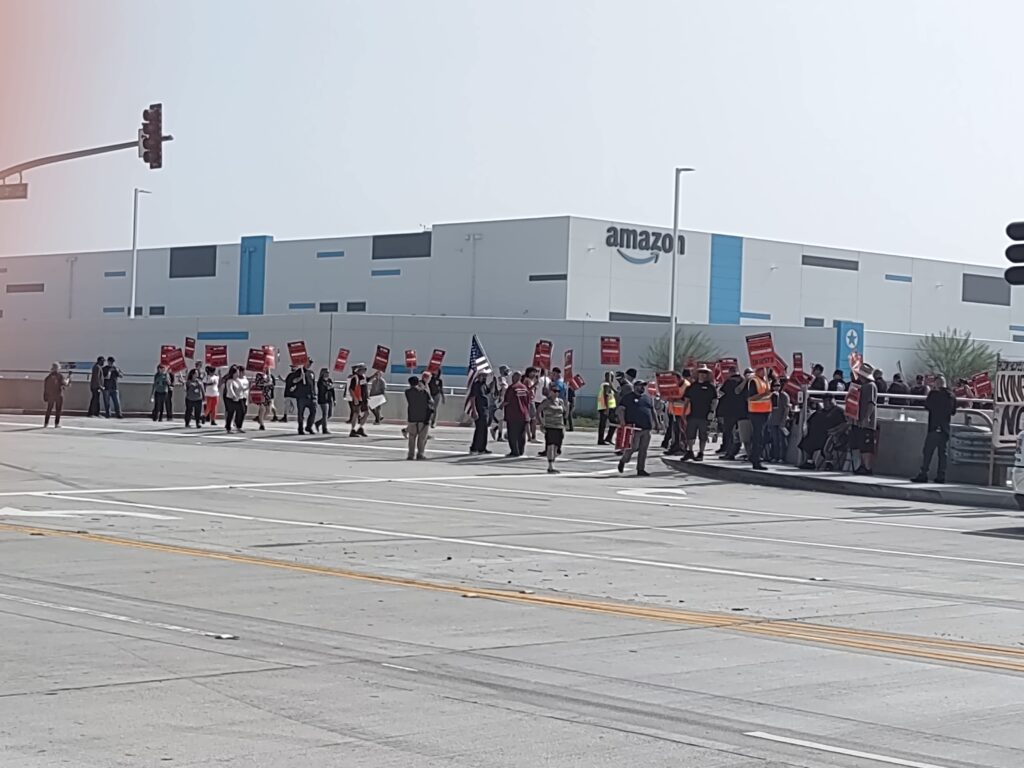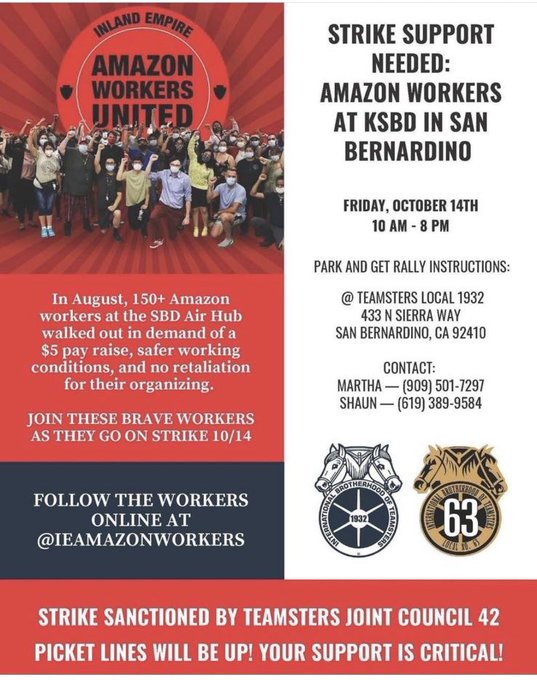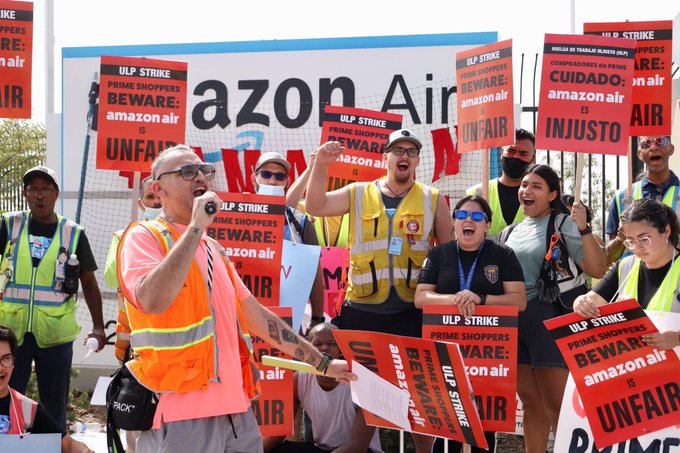San Bernardino Amazon warehouse walkout
Inland Empire Amazon Workers United puts Jeff Bezos on notice.

Last Friday, October 14, approximately 100 workers at a San Bernardino, California air freight hub (KSBD) walked out of the facility to join hundreds of unionists and other supporters. These workers represent the Inland Empire Amazon Workers United (IEAWU). The day before, the workers filed a complaint with the National Labor Relations Board accusing the retail giant of unfair labor practices.
Although IEAWU is not affiliated with the Teamsters Union, Teamsters Local 1932 mobilized public support for the walkout. On Friday afternoon, members of the Local, other unions, members of community organizations, and others picketed with signs reading, “Prime Shoppers Beware: Amazon Air is Unfair.” Picketers chanted, “When workers fight, workers win!” and “Fe, fi, fo, fum, Bezos is a fucking bum!”

The action took place just as the October 11-12 Prime Day packages were due to be fulfilled.
Friday’s action took place alongside other Amazon worker protests, including a union vote at the ALB1 facility in Albany, New York, and walkouts in Joliet, Illinois, and Stone Mountain, Georgia. In April, workers at Amazon’s Staten Island, New York facility (JFK8) won an unprecedented vote to join the Amazon Labor Union. At another Southern California Amazon facility, ONT8, workers attempting to join the Amazon Labor Union have faced anti-union campaigns, harassment, and retaliation.
According to the Los Angeles Times, Amazon has engaged in retaliation against San Bernardino workers organizing for better pay and safer work conditions. Management has interrogated members of the IEAWU, wrote up other employees wearing stickers calling for a $5-an-hour wage increase, and engaged in surveillance against workers involved in organizing.
IEAWU organizer Alfonso Rodriguez stated that the company is paying anti-union “consultants” $2,000 a day to shut down organizing efforts. He reported that one of the tactics of the union-busters is to pit workers against each other along racial lines, encouraging Black and Latinx workers to stay away from walkouts.
The workers, who make between $17 and $20 per hour, are asking for a five-dollar raise. In Southern California, $20 is less than a live-able wage for even a single person in the context of median home prices of more than $600,000, skyrocketing rents, and an inflation rate of 7.9 percent. (By comparison, in 2021, Jeff Bezos made $1.75 billion per week.) And such wages are a pittance for the kind of backbreaking labor Amazon workers perform.
Safety concerns: “It does take a toll on your body.”
Workers who walked out on Friday described not only company efforts to quash organizing but also a set of oppressive work conditions. They described safety concerns, including loading cargo in oppressive heat and maneuvering heavy equipment without adequate protections. Xiomara Quintana described how she and others unload planes and carry boxes weighing up to forty pounds between planes and trucks during shifts lasting ten hours. Her co-worker Shaquille Combs said, “There have been times where I’ve gone home where it’s just my feet start feeling numb from standing and walking all day, moving boxes around and pulling pallets around with shuttles. It does take a toll on your body–back, lower back, and feet.”
The workers use pallet jacks to pull over three hundred pounds of cargo at a time, all while under pressure from management to work more quickly in spite of extreme heat. Combs said that while he and other younger workers could handle some of this pressure, part of the reason they walked out was to speak out for the older people working in the warehouse.
“I went to one meeting where they were discussing how someone had passed out” while loading cargo in 120-degree heat, Combs said. Management allows workers only ten-minute breaks, and often asks workers to compound rest breaks with lunch breaks to force more continuous productivity.
Quintana also mentioned that the pressure to pull cargo on pallet jacks causes workers to rush. “They’re all going fast, going fast, going fast, and sometimes letting go of the shuttle too fast. And then there will be people behind them and they’ll trap them in between the trash cans and the shuttles. And they’ll sometimes be squeezed by the boxes and get injured. I’ve gotten hit by the boxes because they are pushing them and can’t see over boxes that are taller than them.”

“And the case was closed”: Sexism, racism, and homophobia on the floor
Quintana and Combs also mentioned facing sexual harassment and racist abuse in the warehouse, but noted that Human Resources rarely took their complaints seriously. In some instances, grievances were dismissed.
Quintana said that she had been harassed by a co-worker, and another co-worker filed a complaint on her behalf. Management told her that they were going to dismiss the case and that it was “already handled.” Quintana said that she didn’t think that was fair. However, she said, “at the end of the day, I don’t know what happened.”
Combs described an incident in which co-workers explicitly targeted his race. Four workers were coordinating the complex process of opening and closing of doors and the arrangement of cargo for transport. When some boxes appeared to be in the wrong place, a white worker commented, “These fucking monkeys, you know, don’t know how to load trailers the right way.”
Combs’ co-worker heard the remark and reported it to what are euphemistically called “learning ambassadors.” However, these supervisors are not empowered to discipline workers, and nothing happened. The co-worker was advised to take it to HR. Combs was surprised.
“Some other employee had called me and the other associate I was working with monkeys, and in general historical terms, that’s about my race.” Again, however, management did not address the issue. “And the case was closed,” Combs said. A manager told him that there had been no violation. “But so how are you telling me that’s not a racist comment?”
Quintana added that this incident involved a white worker, but that when a complaint was lodged against a Mexican worker, that worker was immediately fired.
Rodriguez, who identifies as queer, mentioned that homophobia was also an issue in the facility. While the company paid lip service to gay pride, but “it was a complete lie. They have managers who are previous military managers who still conduct themselves in a ‘don’t ask, don’t tell’ manner. They don’t ask me to tell them about me because they don’t want me to tell them.”
Rodriguez joked that in response to complaints about anti-gay harassment, managers decided to change the name of pallet boxes from “gaylords” to “shuttles.”
“Gaylord” refers to pallet boxes originally manufactured by the Gaylord Container Company of Saint Louis. The term has nothing to do with homophobia, but, Rodriguez explained, Amazon thought it could address homophobia by changing the product’s name. “The gaylords never did anything to me,” Rodriguez said. “What I hate is that even in erasing that name they are erasing gay visibility and gay people at the warehouse.” In other words, the renaming is a farcical implementation of the principle “Don’t say gay” as a response to homophobia.
The fight for the future: “A cause that’s greater than all of us”
The IEAWU has not decided whether to affiliate with any particular union. However, the strikers hope to build influence in the facility and to be part of building the larger workers’ movement. The organization’s Facebook page describes their cause:
The Inland Empire is the largest warehouse hub in the U.S. It is the heart of our country’s supply chain, and it is made possible by hundreds of thousands working people like us. Amazon is the largest private sector employer in the region. More than 200,000 people work in warehouses in the region, and 1 in 5 of them work in Amazon facilities. Since the start of the pandemic, Amazon has made record-breaking profits and expanded its logistics network. This includes air freight fulfillment centers like KSBB. When KSBD opened in March, 2021, Amazon promised the Inland Empire quality jobs. They failed to deliver. Amazon has forced us to work in extreme heat, barely paid us enough to afford rent, and now we are being retaliated against for speaking up. It’s time for Amazon to value the people who make their business possible.
Rodriguez commented, “We are joining a cause that is greater than all of us. What I hope can happen from this is a ripple so that all of the other facilities, all of us at Amazon, can start feeling the voice inside and to let that voice out and feel empowered.”

Quintana said, “I think we’re looking for an organization, a union, so we can really set the example for other warehouses. We want people to know that we are together, we stay together for this, and we can definitely get what we ask for because they’re getting paid more than we can imagine.”
Anna Ortega, another leader in IEAWU, said the group would continue to take action until they are heard. “We are building the whole movement. We know that what we’re doing here is only going to inspire more people to take up the same actions, to fight for what they deserve, to fight for what’s right.”
Featured Image Credit: Photo by Inland Empire Amazon Workers United; modified by Tempest.
Categories
We want to hear what you think. Contact us at editors@tempestmag.org. And if you've enjoyed what you've read, please consider donating to support our work:
DonateDana Cloud View All
Dana Cloud is a Tempest Collective member and scholar of Marxism, popular culture, and social movements currently teaching at California State University, Fullerton.
